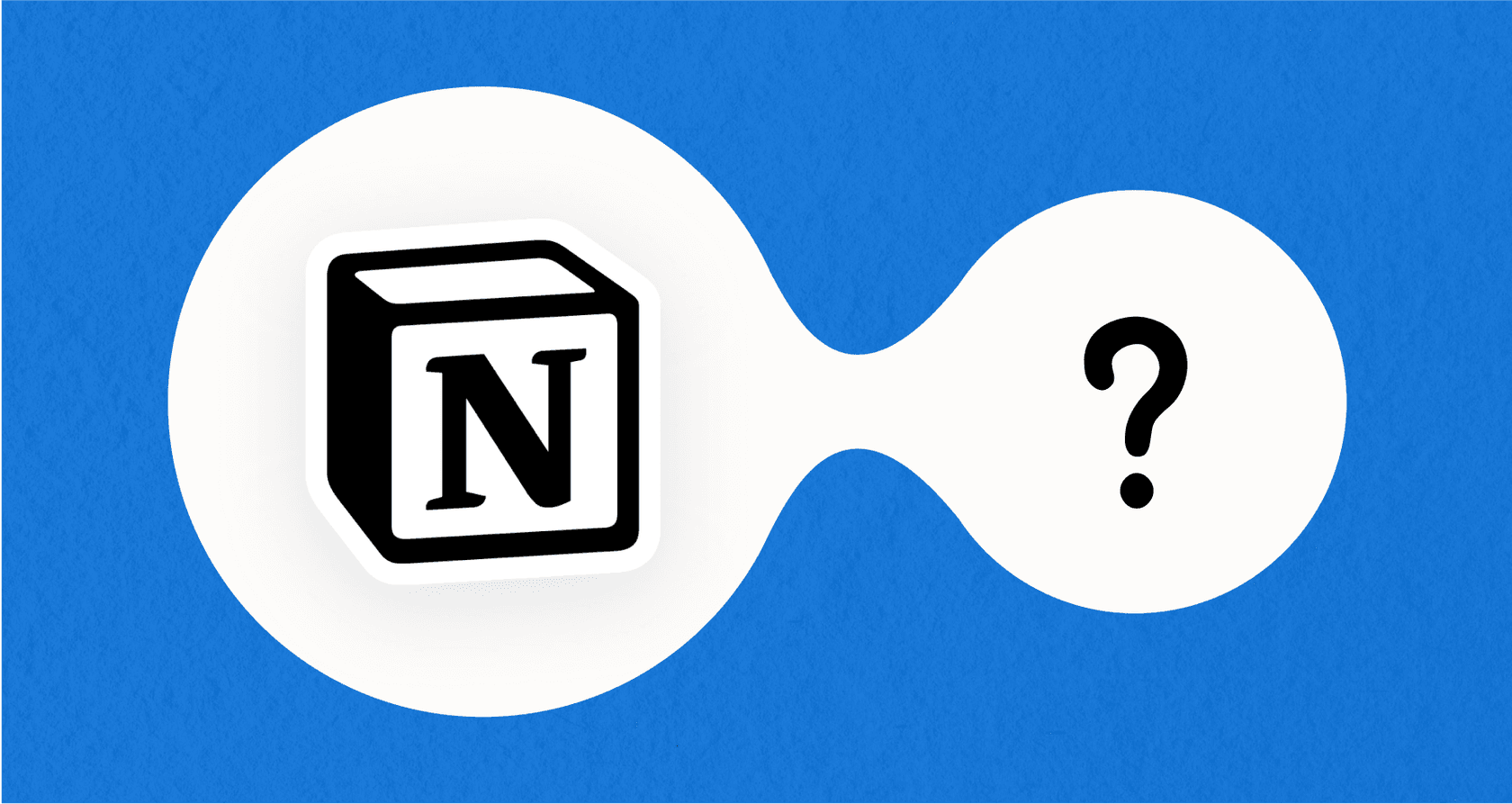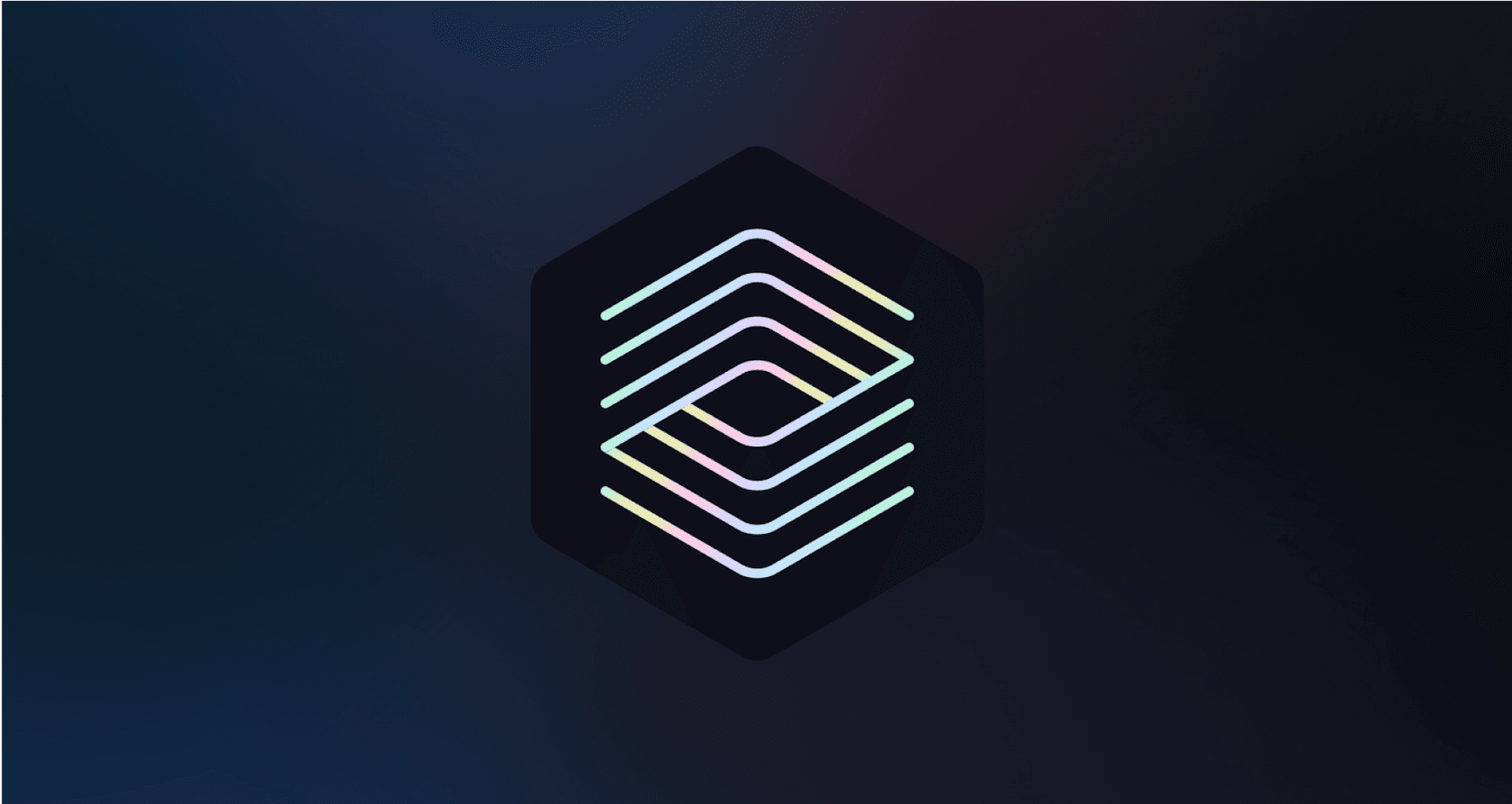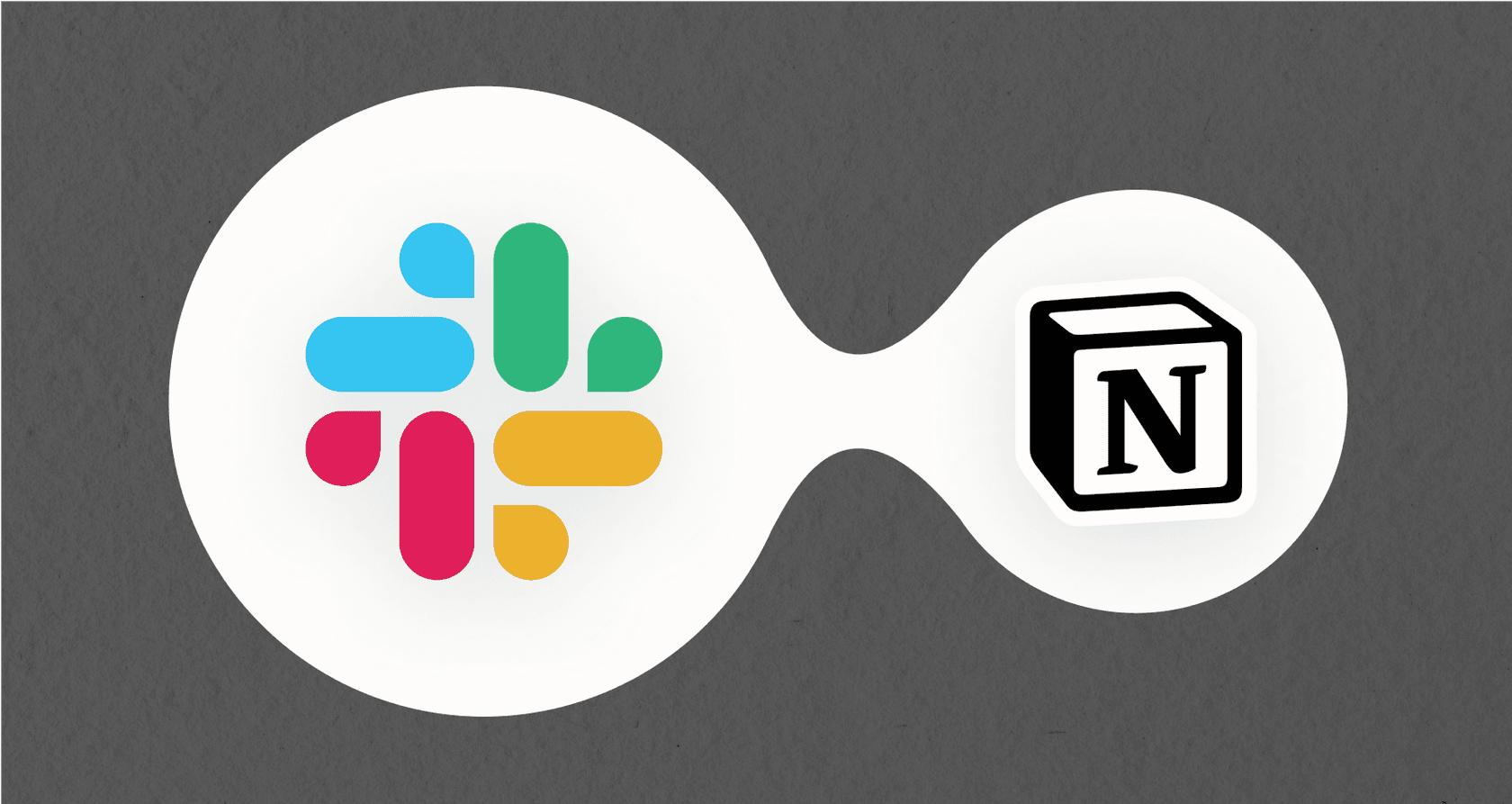
If you're on a modern team, you likely spend your day bouncing between two apps: Slack for the moment-to-moment chats and Notion for the more organized, long-term knowledge. Slack is where the action happens, quick questions are asked, decisions are made, and new ideas pop up. Notion is where all that important stuff is supposed to end up, neatly documented and easy to find later.
The problem, as you've probably noticed, is that the bridge between the two is rickety at best. Important context gets buried forever in a fast-moving Slack channel, and your Notion workspace, while beautiful, can feel disconnected from the real work happening in chat.
Both Slack and Notion have rolled out their own AI features, promising to finally connect these two worlds. There are also various Slack AI integration tools that extend this functionality further. They offer a peek at a workflow where conversations and knowledge are actually in sync.
But how does it all hold up in the real world? This guide will walk you through the native Slack AI integration with Notion AI. We'll explore what it can do, get honest about the limitations you'll hit, and then show you a different way to truly connect your team's most important tools.
What is Slack AI?
Slack AI is a set of AI tools built right into the app you already have open all day. The whole point is to help you find signal in the noise of constant conversation, saving you from the endless, soul-crushing scroll-back.
Here are its main tricks:
-
AI-powered search: You can ask questions like a normal person, such as "what's the latest on the Q4 marketing campaign?" and get a straight answer with links to the original messages. It's a huge improvement over guessing at keywords and hoping for the best.
-
Channel recaps & thread summaries: Just got back from lunch or a few days off? Instead of scrolling through hundreds of messages, you can get a quick summary of what you missed. A single click gives you the key highlights from a channel or a particularly long thread.
-
AI in Workflow Builder: Slack’s automation tool gets a little smarter. You can now build custom workflows that use AI to summarize information or draft messages as part of a process.

Of course, with any AI tool, you have to wonder about data privacy. Slack makes it clear that its AI is built on its own secure systems and they don’t use customer data to train their models for other customers. That’s a relief for anyone who gets nervous about their private conversations feeding a global AI brain.
Slack AI pricing
Slack AI isn't something you buy separately; it's baked into their paid plans. The more you pay, the more AI features you unlock.
| Plan | Price (Monthly) | Price (Annually) | Key AI Features Included |
|---|---|---|---|
| Free | $0 | $0 | Basic AI (Summaries, search, recaps, workflow generation) |
| Pro | $8.75/user | $7.25/user | Basic AI (Same as Free) |
| Business+ | $15/user | $12.50/user | Advanced AI (Includes everything in Pro + file summaries, language translation, AI writing assistance) |
| Enterprise | Contact Sales | Contact Sales | Enterprise-Grade AI (Includes everything in Business+ and adds Enterprise Search across connected apps) |
While these features are great for making sense of what's happening inside Slack, the AI's knowledge is pretty much confined to the platform. Unless you're on the pricey Enterprise plan, Slack AI has no idea what's going on in your Notion docs or other tools. However, you can explore integrations with Google Calendar, Microsoft Teams, or Zoom to expand its reach.
What is Notion AI?
Notion AI is like a little writing and organizing assistant that lives inside your Notion workspace. It helps you draft content, sort through information, and find what you need without ever having to leave the page you're on.
Here’s a look at what it can do:
-
AI writing & editing: It can help you brainstorm, write a first draft of a document, summarize your meeting notes, or even translate text, all from within a Notion page.
-
Q&A and Enterprise Search: Notion AI can answer questions by looking through all the content stored in your workspace. It can also use "AI Connectors" to search other apps, including Slack.
-
Notion Agents: This is one of the newer features, built to handle simple, multi-step tasks. For example, you could have an Agent that reads a meeting transcript, pulls out the action items, and adds them as tasks to a project board.
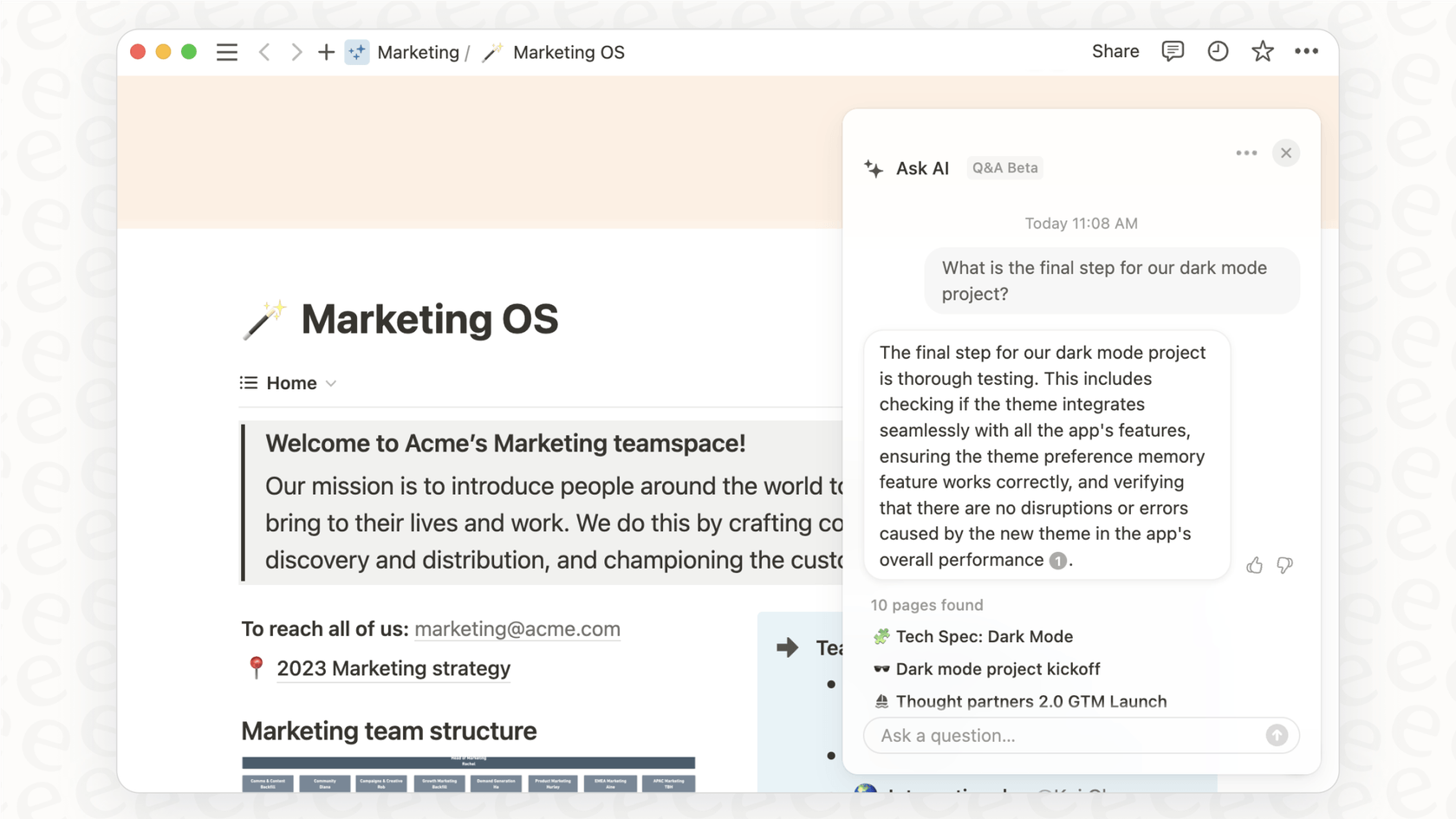
A big piece of this puzzle is Notion's Slack AI integration with Notion AI Connector. This lets Notion AI connect to Slack, read the conversations in your public channels, and pull them into its search results. The catch? You have to be working inside Notion to search for something that was said in Slack.
Notion AI pricing
Notion AI is included if you're on a Business or Enterprise plan. If you're using the Free or Plus plans, you'll get a few complimentary AI responses to test it out before you have to upgrade.
| Plan | Price (Monthly) | Price (Annually) | Key AI Features Included |
|---|---|---|---|
| Free | $0 | $0 | Limited trial of Notion AI |
| Plus | $10/user | $8/user | Limited trial of Notion AI |
| Business | $20/user | $18/user | Notion AI included (AI Core, Meeting Notes, Research Mode, Agent, Enterprise Search) |
| Enterprise | Contact Sales | Contact Sales | Notion AI included (with zero data retention from LLM providers) |
Notion’s strategy is to pull all your external data into its world so you can search it all in one place. It’s a solid idea, but it really doubles down on Notion being the one and only place you go for information, rather than making that information available wherever you are.
How the native Slack and Notion AI integration works
Alright, now that we know what each AI can do on its own, let's see how they play together. The official integrations offer some handy, if basic, ways to connect the two apps.
Key features of the native integration
-
No more mysterious links: When you paste a Notion link into a Slack channel, it unfurls to show you a nice preview of the page title and other details. If the Notion page has an AI-generated summary, that will pop up right in Slack, which is a nice touch.
-
Get notified in Slack: You can set up simple automations in a Notion database to ping a Slack channel. For instance, when a task on your project board gets dragged to the "Done" column, it can automatically post an update to your "#project-updates" channel.
-
Save Slack messages to Notion: From any message in Slack, you can use a shortcut to zap it over to a Notion database. This is great for turning a quick chat into a to-do item or saving a key decision for later.
-
Search Slack from Notion: This is the main search feature. Once you set up the connector, you can ask Notion AI a question, and it will look for answers in your public Slack channels in addition to your Notion pages. It's a one-way street, though; you can't ask Slack AI to search Notion for you. For developers, there's even a Slack AI integration with Cursor for coding assistance directly in Slack.
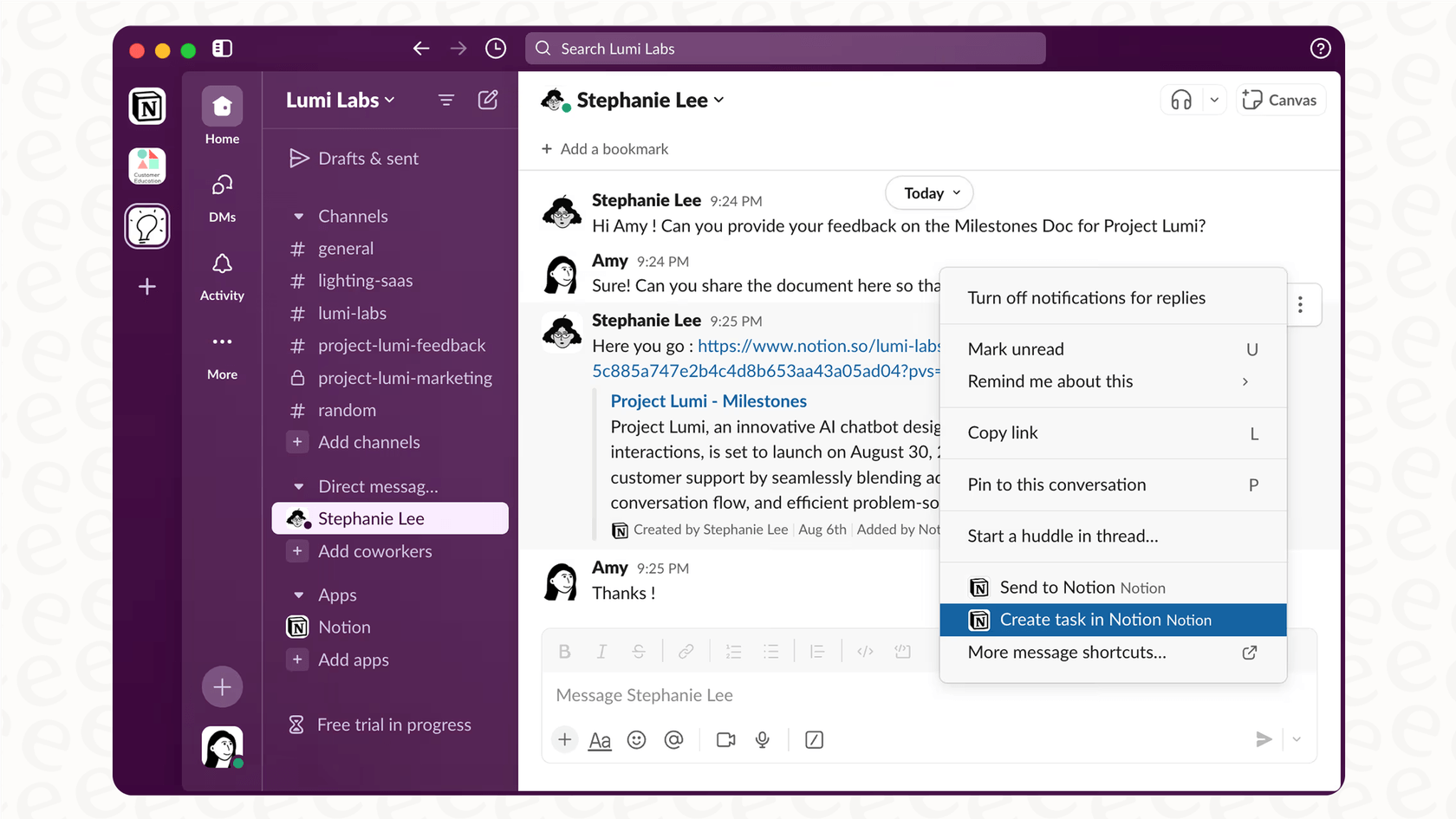
Limitations and challenges you will face
While these features sound pretty good, they often don't quite solve the root problem of having your information scattered everywhere.
-
You're still searching in two different places: The AI experiences are totally separate. Slack AI lives in Slack, and Notion AI lives in Notion. If you need to find something and you're not sure if it was in a doc or a chat, you have to search twice. There isn't one place to ask a question and get a single answer from both your conversations and your knowledge base.
-
The automations are pretty basic: The built-in automations are limited. Want to do something a little more advanced, like send a Slack DM to a specific person when their task is overdue? You’ll probably need to bring in a third-party tool like Zapier, which means another subscription and another tool to manage.
-
Setup can be a headache: Getting the Notion AI Connector running isn't as simple as flipping a switch. You need admin rights in both Notion and Slack to even get started. And even then, it only indexes public channels by default. A ton of important knowledge lives in private channels and DMs, all of which remains invisible to Notion's AI.
-
It finds info, but it can't do much with it: These integrations are mostly passive. They can find information or send a notification, but they can't take action. They can't look up a customer's order in Shopify, update a ticket in Zendesk, and then summarize it all in a Notion page. They’re built to retrieve information, not to automate real work.
A better alternative to the native integration
The shortcomings of the native integrations point to a pretty clear need: a dedicated AI platform that sits on top of all your tools and acts as a unifying layer. Instead of trying to get two separate AI brains to talk to each other, a better approach is to have a single, smarter AI that can access all your information at once.
This is exactly why we built eesel AI. It isn't just another tool to add to your list; it’s designed to bring all your knowledge together and automate work without forcing you to ditch the tools you already use.
Here’s how eesel AI tackles the pain points of the native integrations:
- One search bar to rule them all: eesel AI connects to all your company's knowledge, whether it's in Notion, Slack, Confluence, Google Docs, or your help desk. When you ask a question in Slack, it finds the single best answer from across your entire company. No more guessing where to look; the answer just shows up.

-
Set it up on your coffee break: Forget about wrestling with complicated permission settings or waiting for an admin to approve your request. eesel AI is designed to be incredibly simple and self-serve. You can connect your apps with one-click integrations and launch a powerful AI assistant in minutes, without ever needing to talk to a salesperson.
-
An AI that actually does things: While the native integrations are stuck with simple notifications, eesel AI gives you a workflow engine you can fully customize. You can tell the AI exactly what to do, from looking up order information and updating support tickets to triaging requests and making custom API calls. This is real automation, right inside Slack or your help desk.

- Try before you fly: Rolling out a new AI can feel like a gamble. How do you know it will actually work? eesel AI has a simulation mode that lets you test your setup on thousands of your past conversations. You can see exactly how it will perform, get accurate predictions on resolution rates, and figure out your ROI before it ever interacts with a real person.

Stop switching tabs and start unifying your work
While the native Slack AI integration with Notion AI offers some basic connections, it doesn't really fix the core issue of scattered knowledge and disconnected workflows. Teams still have to jump between apps, search in multiple places, and manually connect the dots.
The real fix isn't a slightly better bridge between two silos; it's a unified AI layer that connects to all your tools, understands your team's specific context, and delivers answers and automation right where you're already working. By bringing your knowledge together without forcing you into a single tool, you can finally cut down on the tab-switching and get back to doing your job.
Unify your knowledge across Slack and Notion today
Ready to break down the walls between your team's conversations and its knowledge base? With eesel AI, you can deploy a powerful AI assistant that learns from all your sources and provides instant, unified answers. Start your free trial and see how it works in just a few minutes.
Frequently asked questions
This integration aims to bridge the gap between quick conversations in Slack and organized knowledge in Notion. It allows for basic actions like unfurling Notion links in Slack, saving Slack messages to Notion, and Notion AI searching public Slack channels.
A key limitation is that search capabilities are separate; Slack AI cannot search Notion, and Notion AI only searches public Slack channels from within Notion. Automations are basic, setup requires admin rights, and a lot of knowledge in private channels remains inaccessible.
To fully leverage the Slack AI integration with Notion AI, you generally need paid plans for both. Slack AI features scale with higher-tier Slack plans, and Notion AI is included with Business and Enterprise Notion plans, with limited trials on lower tiers.
Both Slack and Notion state they build their AI on secure systems and do not use customer data to train models for other customers. When connecting, Notion AI only accesses public Slack channels by default.
No, the native Slack AI integration with Notion AI does not allow Slack AI to directly search your Notion documents. Notion AI can search public Slack channels, but you must initiate that search from within Notion itself.
If the native Slack AI integration with Notion AI falls short, a unified AI platform like eesel AI can provide a single search across all tools, including Slack and Notion. It also offers more advanced, customizable automation capabilities.
Share this post

Article by
Kenneth Pangan
Writer and marketer for over ten years, Kenneth Pangan splits his time between history, politics, and art with plenty of interruptions from his dogs demanding attention.




